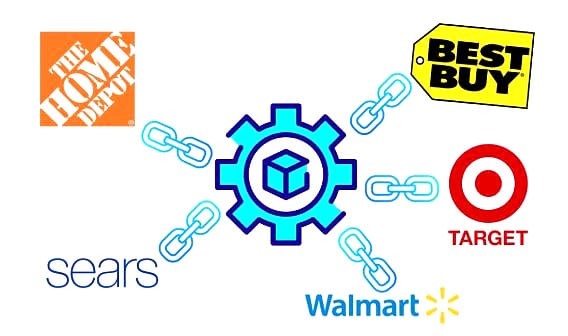The skeletons of massive brick and mortar stores line the streets of America – vestiges of a dying age. 2018 saw the close of over 6,000 stores in America. It’s hard to relegate this to a specific industry – everything from clothing (Diesel and Payless) and appliances (Sears), to wedding dresses (David’s Bridal), toys (Toys R Us), and mattresses (Mattress Firm) have been casualties of the recent years.
It’s easy to point fingers at the emergence of powerful online marketplaces. Amazon has become one of the most influential corporations and only recently made an entrance into the bricks-and-mortar scene. But this logic would suggest that stores that sell products that people prefer to buy in-person would be insulated from this competition. That hasn’t been the case.
 Even retailers who sell items like mattresses, clothes, shoes, and wedding dress have seen their stores close. It was expected that toy or technology dealers would see sales lost to online marketplaces, but are people really purchasing wedding dresses and mattresses online? The reality is, there’s more at play here than just mere convenience. Retail stores are failing because they’re no longer appealing to people. Perhaps blockchain can be their saving grace.
Even retailers who sell items like mattresses, clothes, shoes, and wedding dress have seen their stores close. It was expected that toy or technology dealers would see sales lost to online marketplaces, but are people really purchasing wedding dresses and mattresses online? The reality is, there’s more at play here than just mere convenience. Retail stores are failing because they’re no longer appealing to people. Perhaps blockchain can be their saving grace.
Let’s consider the fact that people buy things in-person for two reasons: enjoyment and necessity. Some products are just difficult to purchase online — you need to try out a bed before you buy it. Other things are just enjoyable to do in person, even if they can be conveniently done at home. Movie theaters are seeing a resurgence despite the plethora of in-home streaming services. Coffee shops and bars are as popular as ever, yet coffee and alcohol can be ordered online, delivered to your door, and enjoyed for cheap at home. People go to these places because they enjoy them. They’re prepared to pay a premium for the experience.
This is why Ikea continues to thrive. This is also what Amazon has understood as it emerged into the retail store market (Amazon Books). The recent death of so many physical stores proves that necessity is no guarantee of continuity. Today people might go to grocery stores because they want to test food quality and freshness. But if people don’t enjoy the grocery store shopping experience, alternatives that they do enjoy will surely emerge.
If retail stores want to survive, they need to manufacture enjoyment. Some markets are likely hopeless. Tech accessories will likely always be quickly purchased online. But this means that there is hope for book stores and for clothing stores; perhaps even Blockbuster might have endured had they understood this principle.
Enter blockchain. Decentralized technology provides the tools to make shopping enjoyable again. Imagine walking into a store and immediately receiving a personalized shopping experience. Facial recognition software knows your buying preferences. VR allows you to test items out from the store — try on clothes, see what that couch looks like in your living room, drive that Tesla with no annoying traffic. Automated payments and RFID tags mean no waiting in line, no collecting coupons, no annoying store clerks. Retail stores could become a virtual reality theme park — buy only what you enjoy using.
All of this requires the collection and maintenance of enormous amounts of customer data. Customers today are less and less willing to freely give up this information. Blockchain provides the platform for users to retain control and autonomy over their data, yet share select elements of it for in-store experiences like this. Elements like zero-knowledge proofs could even allow stores to personalize aspects of the shopping experience without ever seeing the exact underlying information from the customer. A database of products from stores all across town would guarantee the customer that they always receive the most competitive price. Essentially, blockchain could be the operating system on which retail stores could once again gain relevance.
Cryptocurrencies would make payments seamless. Stores could also create their own currencies — an innovative update on the reward credit cards that stores offer. It would make offering coupons and rewards extremely easy and would cut out the large percentages that stores pay to credit card providers. These discounts could be passed along to the customer.
 Combine the efficiencies of cryptocurrencies with the fact that stores could very soon be employee-less, and it’s reasonable to expect that future retail prices could be lower than online prices today. Amazon spent $21.7 billion on shipping in 2017. If going to a retail store stopped being an inconvenience, customers could benefit from both an enjoyable experience and lower prices.
Combine the efficiencies of cryptocurrencies with the fact that stores could very soon be employee-less, and it’s reasonable to expect that future retail prices could be lower than online prices today. Amazon spent $21.7 billion on shipping in 2017. If going to a retail store stopped being an inconvenience, customers could benefit from both an enjoyable experience and lower prices.
Retail stores have failed to innovate but they’re not dead yet. While technological advancements led to their fall, technology might also be the key to their revival. Developments in artificial intelligence, automation, and virtual reality could be the tools that make people want to go shopping at their local brick and mortar store. Blockchain offers a solution to connect these technologies with each other and personalize them for the customer. Cryptocurrencies can streamline the transaction process. The retail store industry may even be exactly what blockchain needs — a market where it could make an immediate and dramatic impact. It may just be a matter of time.
Crowd-related breakthroughs and the market disruption they can cause will be the subject of sector-leading speaker sessions and panel discussions at our next international conference, CSW Global 2019, running September 12-13 in San Francisco. Registration is open, you can reserve your place now.






0 Comments